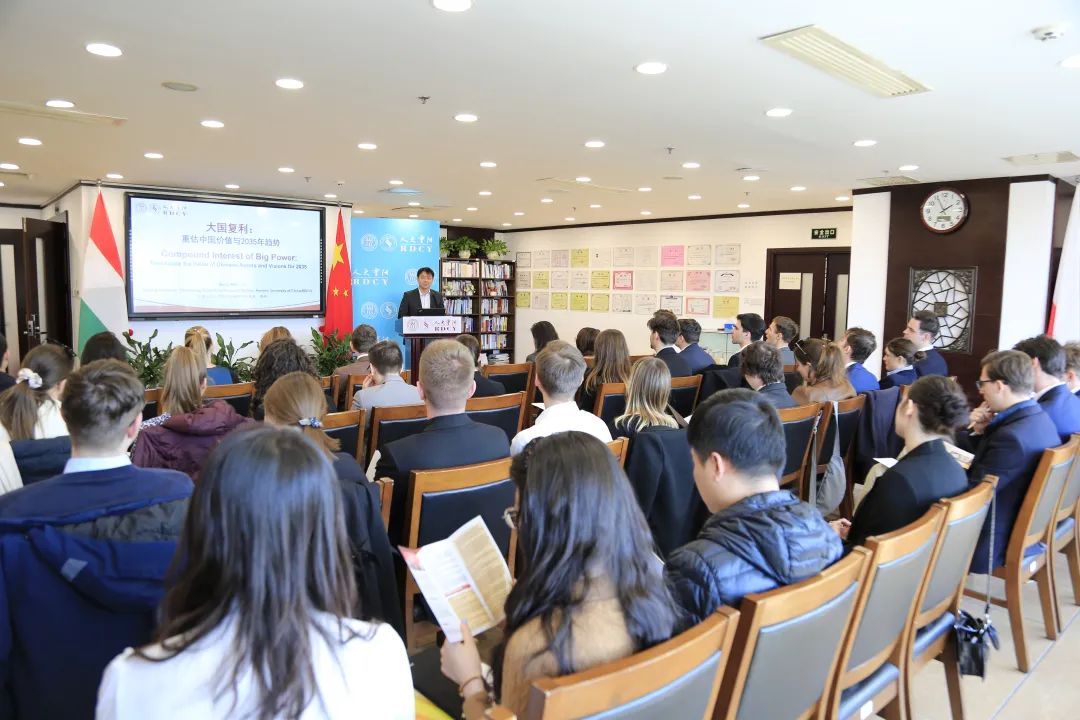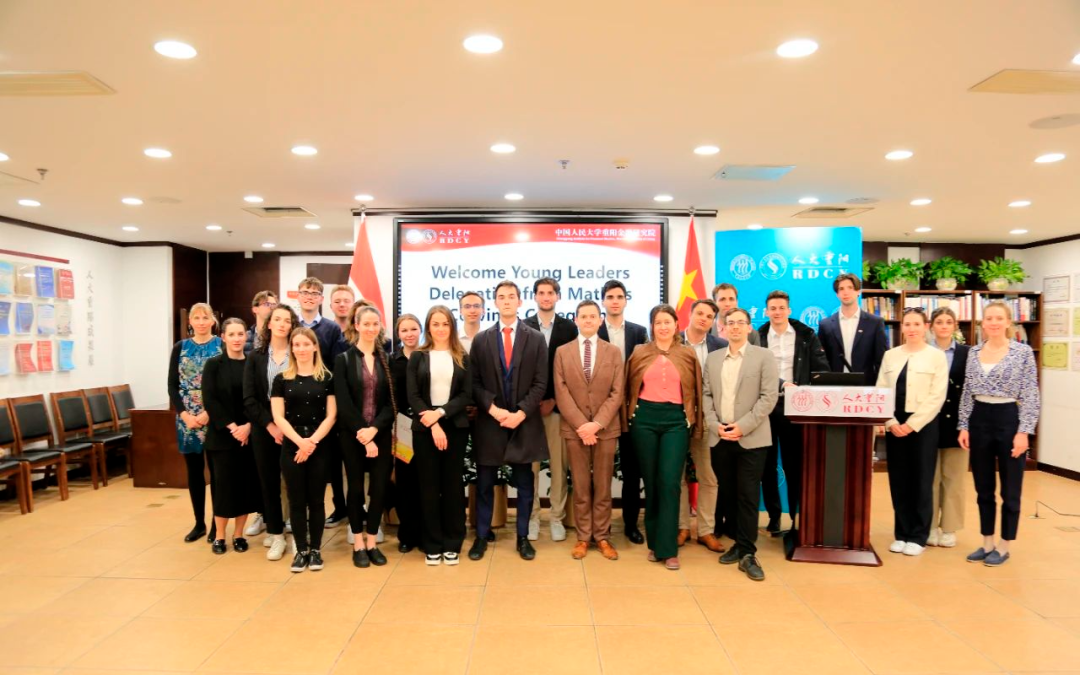Past Events
Your Present Location: EVENTS> Past EventsMCC Young Leaders' Visit to RDCY

On April 1, 2025, a delegation of 28 young leaders from the Mathias Corvinus Collegium (MCC) in Hungary visited the Chongyang Institute for Financial Studies at Renmin University of China (RDCY). Wang Wen, Dean of RDCY; Yang Qingqing, Deputy Dean; Liu Ying, Researcher Fellow; Xu Tianqi, Deputy Director of International Department and Associate Researcher Fellow; Shen Yujing, Deputy Director of Macro Research Department and Associate Researcher Fellow, and other experts engaged in an in-depth exchange with the delegation on the theme of “Compounding Interest and China’s Future”.
In the keynote speech titled “Compound Interest of Big Power: Re-evaluate the Value of Chinese Assetes and Visions for 2035”, Wang Wen used the “compound interest effect” as a theoretical framework to systematically explain China’s latest development achievements in five major areas: new wellbeing, new consumption, new manufacturing, new infrastructure, and new services. Wang also elaborated on Chinese practical path of breaking development bottlenecks through six major reform battles, including anti-poverty, anti-blockade, anti-pollution, anti-corruption, anti-hegemony, and anti-crises, all of which have made great process during the past 12 years. He pointed out that Chinese modernization, driven by innovation, deepened reforms, expanded opening up, green development and etc., has formed a stable, long-term, and sustainable “compounding interest” effect for China as a major country. Looking forward to the development vision for 2029 and 2035, Wang Wen proposed seven outlooks, saying China will have a more robust ecnonomy, more diversified democracy, more popolar culture, more comfortable life, greener environment, etc. He emphasized that China will remain committed to reform and opening up, and contribute Chinese wisdom in the reform and development of the global governance system.
During the interactive session, Hungarian youth representatives asked questions on topics such as China’s overseas projects, livelihood development, economic challenges, and urbanization. Wang Wen responded that China’s investment in the livelihood sectors such as the national financial expenditure on education, healthcare, social security, and employment continues to grow faster than GDP in the past years, reflecting the Chinese government’s high emphasis on livelihood issues. In the face of external technological blockades against China, he emphasized that China always believes in the saying, “it takes a good blacksmith to make good steel,” and the core of China’s development lies in releasing long-term growth potential through China’s ongoing reforms. In the future, China will achieve more breakthroughs and results through continuous innovation and international cooperation. He also pointed out that China’s overseas projects benefit not only Chinese enterprises, but also the people of the host countries, and even regional and global development. Wang Wen encouraged Hungarian youth to interact more with Chinese friends, to understand each other through in-depth exchanges, to transcend differences, and to jointly promote the construction of a community with a shared future.
In the free exchange session, Xu Tianqi reviewed the history of friendly exchanges between China and Hungary, pointing out that under the framework of the Belt and Road Initiative (BRI), China’s investment in Hungary significantly increased in 2024 and recent years, with highly compatible development strategies between the two sides. Liu Ying emphasized that 2025 marks the 75th anniversary of the establishment of diplomatic relations between China and Hungary. The Hungary-Serbia Railway increases the connectivity in Europe, showingcasing that China-Hungary cooperation, driven by innovation, shows strong vitality. Shen Yujing, taking technological change as an example, explained how reforms drive the compound interest effect, highlighting the transparency of China’s reform plans and the achievements that have been made.
Yang Qingqing concluded by stating that RDCY will continue to implement educational and academic projects between Renmin University of China and Hungarian institutions, and will build more international platforms and projects to promote pragmatic cooperation between Chinese and Hungarian youth leaders in the fields of economy, culture, and technology.
The Hungarian young leaders visiting China are members of MCC Leadership Academy, an unique leadership training program at the Mathias Corvinus Collegium, an educational institution and research center devoted to the flourishing of the Hungarian nation. These young leaders, who excel in their respective fields such as international relations, economics, computer science, and law, have the opportunity to gain a deep understanding of China’s development philosophy and model through this visit. This exchange also helps them broaden their international horizons and enhance their global leadership, laying the foundation for future multi-field cooperation between China and Hungary, and China and Europe.
Previously, RDCY had also hosted delegations such as the Chilean macroeconomic development and planning seminar, a study group of over 30 section-level officials from eight Latin American countries; the China-Russia political leadership international study group; and a delegation of senior Indian media professionals. These groups engaged in exchanges and cooperation on issues such as economic development, bilateral relations, regional situations, and cultural dissemination.

Péter Király, Deputy Head of Mission, Second Counsellor from Embassy of Hungary, Beijing; Zhou Wa, Project Manager of International Department of RDCY; along with operation staff, Xing Ziru, Zhang Chufan, and Min Zhe, attended the event.























































































 京公网安备 11010802037854号
京公网安备 11010802037854号





